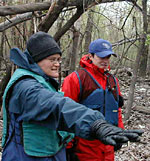By Mary Losure
Minnesota Public Radio
May 10, 2002
In 1997, a young Mississippi River clammer named Chad Pregracke got tired of looking at trash in the river, and began a single-handed effort to do something about it. Since then, he's cleaned up hundreds of miles of the Mississippi and its tributaries. He's fished rusting barrels, defunct appliances, and football fields worth of Styrofoam® out of the river, attracting corporate support and becoming something of a celebrity along the way. He's been featured on CNN and in Time and People magazines, but he still devotes most of his time to the unglamorous pursuit of trash. Reporter Mary Losure caught up with him and local environmental activist Anne Hunt as they scouted out cleanup prospects along the Mississippi south of St. Paul.
| |
|
|
|
||
When Chad Pregracke scouts for trash, he looks for bends in the river. That's where it collects.
"Like this spot's a bad spot, because it's loaded with garbage, a good spot for cleanup, 'cause everything's in a tight spot and there's a lot of little stuff. There's some barrels , 55-gallon drums over there, there's two of those right there. There's three or four tires over there,and all the plastic bottles and everything. There's just a lot of stuff," Pregracke says.
Today he and his friend and fellow river-cleaner, Anne Hunt, have debarked from Hunt's 16-foot johnboat and are making a mental inventory of what it will take to clean this particular bend; shovels for the submerged tires, for example, and strong backs for the drums.
Hunt is the organizer for next month's Mississippi River Relief and Big River Clean Up. It will cover almost 50 river miles, from Prescott, Wisc., to St. Anthony Falls in the Twin Cites. It will be the largest ever in the area.
The two of them hatched the idea after Hunt met Pregracke last summer. He was repairing a tugboat he bought for cheap from a local barge company, Upper River Services.
Hunt lives on a houseboat on Harriet Island in St. Paul and often rides on the river in her johnboat with her two dogs. She's also friends with the owners of Upper River Services.
"Last summer when Chad was up here picking up his towboat, they introduced me to Chad and they said, 'Oh, you'll love Anne, she's another river rat.' So we went scouting out for trash and looking for places we could have a cleanup. I had been the director of the Neighborhood Energy Consortium in St. Paul and had done recycling and energy conservation. So I've got a unique qualification for knowing a little bit about the river and lots about garbage," Hunt says.
They got funding from major corporate sponsors such as Cargill and Flint Hills Resources, along with an array of environmental and civic organizations.
The two of them fan out into the woods, scoping out the debris. Hunt says with the big floods of the past few years, she often sees picnic tables, parts of farmers' sheds, you name it.
| |
|
|
|
||
"Some of the stuff, like yesterday we were out scouting and we found a couch, over by Pike Island in St. Paul, and the only way it could have gotten there was somebody dumped it along the shore when the water was up high; it got washed in. Now it's kind of wedged up on Pike Island. So we'll get all that stuff out.
"I live on a houseboat and it's just frustrating. Every time there's a big rainstorm, there's a big storm sewer down by St. Paul and the stuff will just come gushing out there. Cigarette butts, that's what make me really irritable. People who throw cigarettes out the window and take their ashtray and pour it on a parking lot, it all comes washing down here. We were looking at some spots in Lillydale. The Scout troops, they could spend hundreds of hours, just picking up cigarette butts," Hunt says.
Still, they stride through the woods with infectious enthusiasm, planning the cleanup.
For Pregracke, it will be just more trash to add to the tons he's already fished out of the Mississippi. He's planning some projects that will help the river in other ways, but for now, he's sticking with trash.
"I'm picking my battles, and this is what I'm focusing on now. Trash is the least of the river's problems, but it's a way that people can get out there and do something positive for the river, and feel good about doing it. And there's obviously a lot bigger problems associated with the river and those are huge problems with no easy answers, but through garbage, through getting the people out there, and doing something positive, when those other bigger problems are addressed hopefully all those people will step up, that came out here and spent four or five hours digging up barrels or whatever," he says.
Hunt and Pregracke hope to get as many as 1,500 people to fill three barge-loads of garbage. The Mississippi River Relief-Big River Clean Up will take place June 22 through June 30.
More from MPRMore Information


